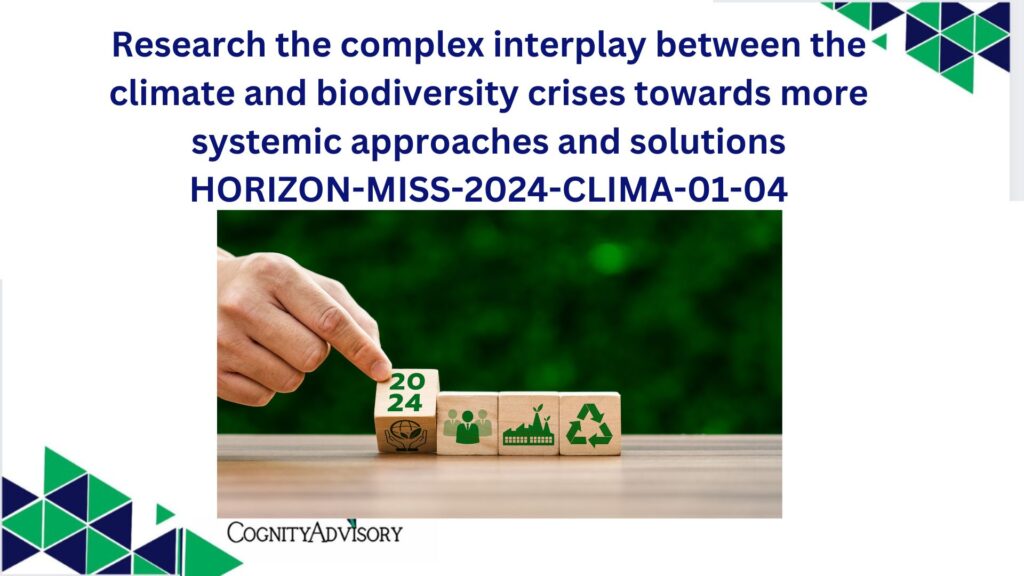HORIZON-MISS-2024-CLIMA-01-04
General information
Programme
Horizon Europe (HORIZON)Budget overview
Call
Type of action
HORIZON-RIA HORIZON Research and Innovation Actions
Type of MGA
HORIZON Action Grant Budget-Based [HORIZON-AG]
Open For Submission
Deadline model
single-stage
Opening date
24 April 2024
Deadline date
18 September 2024 17:00:00 Brussels timeTopic description
ExpectedOutcome:
In support of the European Green Deal, the Adaptation Strategy, the Biodiversity Strategy for 2030 and the Mission on Adaptation to climate change and the Global Biodiversity Framework, successful proposals will contribute to addressing the climate and biodiversity crises in a more systemic way.
Projects results are expected to contribute to all of the following expected outcomes:
- improved capability of the research community in assessing and modelling, in a systemic way, the impacts of the climate and biodiversity crises on the key community systems considered in the Mission implementation plan[1], and their interdependencies.
- public administration from national to local level are using evidence-based information provided by the project to prioritise actions that address cascading, compound risks from both crises, increasing climate resilience while, at the same time preserving and restoring biodiversity.
- Public regional and local authorities are better able to prioritise investments and select effective options that allows to reduce/manage the risk and effects from both crises on the key community systems considered in the Mission implementation plan[2];
- improved regional and risk assessments that capture more effectively interdependencies between both crises and cascading, compound risks and tipping points.
Scope:
Climate change and biodiversity loss are two interdependent crises that are complex, cascading, and compounding. Tackling them in an effective way must rely on a much more systemic approach than what has been achieved so far, which requires a better understanding of their interdependencies and feedback loops.
This topic aims at:
- Better understanding how the climate and biodiversity crises interact, how they reinforce each other and how they are best addressed together.
- Building tools and designing solutions to break siloes and address multiple risks stemming from the climate and biodiversity crises in a systemic way, maximising the synergies and minimising the trade-offs between both crises.
To achieve those goals, proposals should address all of the following aspects:
- Investigate case studies on cascading, compound climate risks triggered by extreme weather and climate events, as well as slow onset event in relation to changes in biodiversity, ecosystem services, food security, natural resources and water systems.
- Investigate case studies on how biodiversity loss accelerates climate change or reduces resilience to climate change (by increasing vulnerability and exposure).
- identify co-benefits of the implementation of nature-based solution for adaptation to climate change and for biodiversity conservation and restoration.
- Identify and evaluate maladaptation actions or negative impacts of climate adaptation options on other aspects or sectors, particularly on biodiversity and, conversely, identify and evaluate how biodiversity restoration actions might negatively impact climate adaptation capacity.
- Look into how the combination of climate adaptation and biodiversity actions reinforce or weaken each other and how the combined effect of adaptation and biodiversity actions differs from the sum of individual actions.
- All of the above should lead to the identification of actions that simultaneously halt the loss of and restore biodiversity and enhance the resilience of societies and ecosystems in a changing climate. In other words, proposals should provide concrete policy recommendations (e.g., the field of land use, spatial and urban planning, etc.) that address the biodiversity and climate crises in a more systemic way and that minimise trade-offs between different risks.
To ensure that the knowledge produced by the projects useful to policymakers, proposals should present a credible plan to engage with public administrations at various levels, including regional/local authorities and to pass on the information to them.
Proposals should include a mechanism and the resources to establish operational links and collaboration with Mission Implementation Platform[3]; the Climate-ADAPT platform[4]; and the Joint Research Centre’s Risk Data Hub[5].
Linking the project to the second European Climate Risk Assessment, if confirmed, or any relevant project from Horizon Europe is encouraged.
Additionally, proposals should build on and connect to other relevant projects funded by Horizon Europe, in particular projects CLIMAAX[6], MYRIAD-EU[7], ACCREU[8], SPARCCLE[9], as well as the projects funded by the “HORIZON-CL4-2023-SPACE-01-31: Copernicus for Atmosphere and Climate Change, including CO2”, and Horizon Europe Cluster 6 projects on biodiversity, including the European Partnership for Biodiversity (Biodiversa+), and on nature-based solutions.
Finally, proposals should explore synergies with the projects funded under the topic “HORIZON-MISS-2024-CLIMA-01-09: Systemic and cross-sectoral solutions for climate resilience, tailored to the specific needs of regions and local authorities” of this call.
